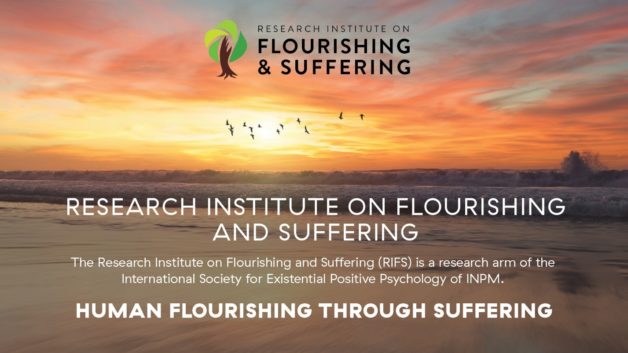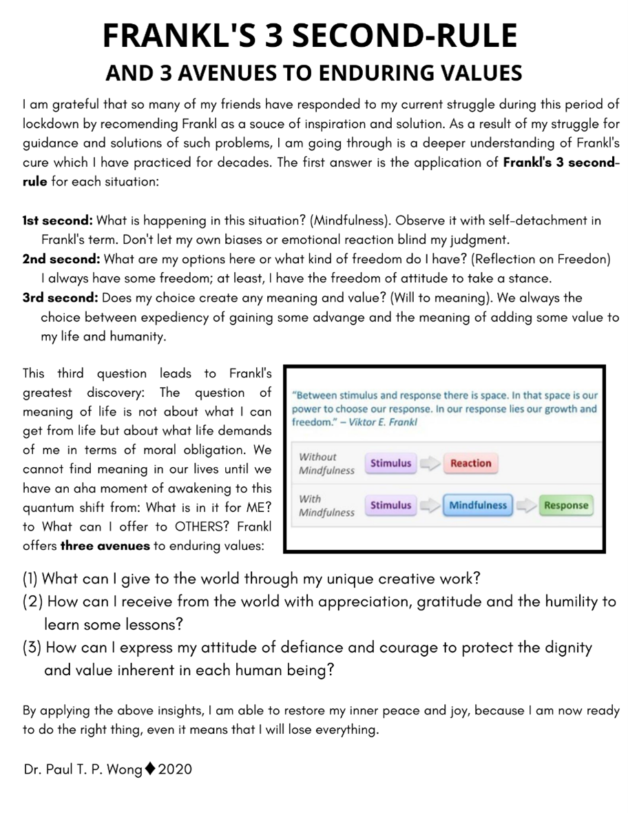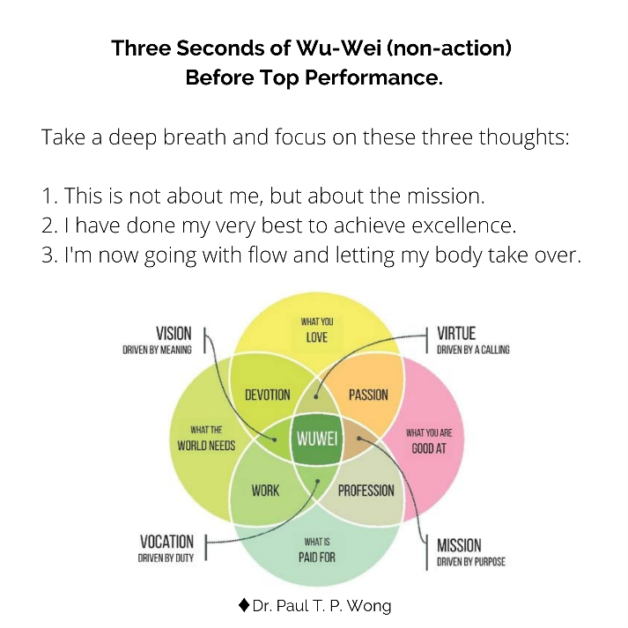
Dr. Paul T. P. Wong, Ph.D., C.Psych
From the perspective of second wave positive psychology (PP 2.0), the complexity of the human mind can be best understood in terms of contradictions between opposing forces, such as good and evil, happiness and suffering. Therefore, the circle of wholeness and wellbeing consists of two halves, the existential positive psychology of suffering (Yin) and the positive psychology of flourishing (Yang).
Research on the relationship between flourishing and suffering demands more attention because healing, flourishing, and growth may depend on the optimal tension and balancing between conflicting forces. (Wong, 2019). When we embrace suffering and death as part of us, and work with them as our life partners, we may become more open, authentic, and creative, resulting in sustainable flourishing.
“Yes, ironically, this is the very wound that can lead to new spiritual growth. Thinking of your death can help you to radically alter your fixed and habitual perception. Instead of living according to the merely visible material realm of life, you begin to refine your sensibility and become aware of the treasures that are hidden in the invisible side of life.” (O’Donohue, 1999)
The RIFS is the research arm of the International Society for Existential Positive Psychology, the professional division of the INPM. Its objective is to support original collaborative research, maintain a Research Ethics Board, and publish a peer reviewed journal (The International Journal of Existential Positive Psychology [IJEPP]). You are invited to becoming a founding member of this institute by joining the INPM.
References
O’Donohue, J. (1999). Anam Cara: Spiritual wisdom from the Celtic world. Transworld Pub.
Wong, P. T. P. (2019). Second wave positive psychology’s (PP 2.0) contribution to counselling psychology. Counselling Psychology Quarterly [Special Issue]. Retrieved from https://doi.org/10.1080/09515070.2019.1671320
Recommended Readings for the Existential Positive Psychology (2.0) of Flourishing Through Suffering*
*This list is far from being exhaustive. We have included those publications that have played an important role in the development of existential positive psychology and Paul Wong’s own publications on this subject matter. We welcome suggestions of additional publications important for this emerging field.
Click here to see full list.
Related Articles
- Wong, P. T. P. (2021). Positive psychology goes to hell and back. DrPaulWong.com http://www.drpaulwong.com/positive-psychology-goes-to-hell-and-back/
- Wong, P. T. P. (2003, August). Finding happiness through suffering [President’s Column]. Positive Living Newsletter. http://www.drpaulwong.com/finding-happiness-through-suffering/
RIFS Researchers
DIRECTOR
Paul T. P. Wong, Ph.D. (University of Toronto), C.Psych, is Professor Emeritus of Trent University and Trinity Western University. He is a Fellow of APA, APS, and CPA, and the founding President of the International Network on Personal Meaning and the Meaning-Centered Counselling Institute. He is Editor-in-Chief of the International Journal of Existential Positive Psychology and Consulting Editor of the Journal of Humanistic Psychology.
As a research psychologist, he is well known as a leading authority on Viktor Frankl and Logotherapy. As a pioneer of the positive psychology of suffering, he is responsible for a major paradigm shift from positive psychology to the existential positive psychology of flourishing through suffering.
He has published 8 books and more than 300 articles and book chapters, with increasing impact according to Google Scholar. He is also shortlisted by AcademicInfluence.com as one of the most “noteworthy and influential psychologists,” with a world ranking of No. 155. He has been invited to give keynotes, webinars, workshops and lectures on all 7 continents.
As a clinical psychologist, his spiritual mission is to spread the good news of self-transcendence – the hope of awakening people to their potential to see the light and be the light in darkness through faith in God. The struggle of turning suffering into highest achievement will make people strong and whole with a sense of peace and harmony.
His brand of Integrative Meaning therapy (IMT) aims at unlocking the transforming power of suffering. It incorporates various therapeutic modalities, such as CBT, narrative therapy, and cross-cultural therapy, with meaning as the central integrating construct. Rather than focusing on symptom reduction, IMT emphasizes that both healing and flourishing can be achieved by meeting the basic human need for meaning, relationships, and faith.
The motto of IMT is “Meaning is all we have; relationship is all we need.” The ideal client is someone who feels trapped in a living hell or thinks that it is futile to strive and life is meaningless.
As a Christian leader, he was the founding pastor of Toronto’s first Chinese Gospel Church and founder of the Peterborough Chinese Christian Fellowship. His other leadership positions include the Founding Director of the Graduate Counselling Program at Trinity Western University, and Head of Social Science Division at Tyndale University.
CO-DIRECTOR
Claude-Hélène Mayer is a Professor in Industrial and Organisational Psychology at the Department of Industrial Psychology and People Management at the University of Johannesburg, South Africa. She holds Doctoral degrees in Psychology, Management and Cultural Anthropology. Her Venia Legendi is in Psychology with focus on Work, Organisational and Cultural Psychology (Europa Universität Viadrina, Frankfurt (Oder), Germany).
Her research areas include transcultural mental health, salutogenesis, transcultural conflict management and mediation, women in leadership, shame and love across cultures, The Fourth Industrial Revolution, and psychobiography. She is the winner of the William B. Gudykunst Book Award 2023, awarded by the International Academy of Intercultural Research (IAIR). Her teaching areas are cross-cultural psychology, mental health, psychobiography, organizational theory, systems and design thinking, coaching, positive psychology, organizational behaviour and transcultural conflict management and mediation.
She is a Semester at Sea Alumni (SASFA22) and a Board member of the International Academy of Intercultural Research (IAIR). Claude is a Senior Editor for the Europe`s Journal of Psychology (EJOP), and an Associate Editor for Frontiers in Psychology (Positive Psychology), and for the International Journal of Cross-Cultural Management (IJCCM).
She works as a licenced systemic family therapist and facilitator in family therapy (SG), constellation facilitator (KI), mediator and mediation facilitator (BM 2001-2021), hypnotherapist (TIM) and coach in private practice (all accreditations are from Germany). Since 2005 she works as an international consultant with leaders and international organizations predominantly in Europe and Southern Africa.
New Ideas for PP 2.0 Research: Existential Positive Psychology (PP 2.0) and Positivity Ratios
What would be the best positivity ratio for you? It seems intuitive that the greater the ratio the better. Thus, a ratio of 10 positives to 1 negative would be the best. However, one can get bored eventually even with the most desirable positive experiences. One would have to create some feelings of sadness, even when one lives in a world of perfect happiness.
Personally, I totally enjoy a state of bitter-sweet nostalgia in my old age, and I enjoyed feelings of melancholy as a young man. Thus, what ratio would be best for your all depends on your personality, culture, and the context you are in.
In positive psychology, the positive ratio of three positives to one negative used to be touted as the golden rule for happiness (Fredrickson, 2013; Fredrickson & Losada, 2005). Although Barbara Fredrickson’s concept of a critical positivity ratio has been debunked by Nick Brown (Brown et al., 2013, 2014a, 2014b; Friedman & Brown, 2018; Rotondaro, 2013; Snæbjörnsdóttir, 2010), the positive ratio remains a powerful concept, especially for existential positive psychology (PP 2.0) in the age of COVID-19.
PP 2.0 insists that any true measures of wellbeing, meaning, or the growth mindset must factor in some aspects of the dark side of life, such as the Dark Triad of personality, Viktor Frankl’s Tragic Triad of life, or sickness.
According to this conceptual framework, positive and negative conditions must be employed as co-variates. Similarly, outcome measures must include the Yin-Yang aspects of human experiences. Thus, measures of complete wellbeing must include both the happiness index (SWB) and suffering index, which could be calculated as a positivity ratio.
In other words, any measure of positive outcome in a world full of hardship and suffering need to incorporate some measure of negative experience. One way to do it is to use the positivity ratio. For example:

My hypothesis is that future research will support the following:
(a) The optimal positive ratio varies according to the whether the context is predominantly a happy occasion (e.g., wedding, promotion) or a sad occasion (e.g., funeral, unemployment), or whether the culture is preoccupied with the pursuit of happiness or with relief from suffering.
(b) The positivity of 3:1 units is not the same as 9:3 units, because that the greater the unit, the more intense the positivity or negativity; it is based on the assumption that positivity and negativity are two separate but interacting dimensions rather than two poles of the same dimension.
References
Brown, N. J. L., Sokal, A. D., & Friedman, H. L. (2013). The complex dynamics of wishful thinking: The critical positivity ratio. American Psychologist, 68(9), 801–813. https://doi.org/10.1037/a0032850
Brown, N. J. L., Sokal, A. D., & Friedman, H. L. (2014a). Positive psychology and romantic scientism. American Psychologist, 69(6), 636–637. https://doi.org/10.1037/a0037390
Brown, N. J. L., Sokal, A. D., & Friedman, H. L. (2014b). The persistence of wishful thinking. American Psychologist, 69(6), 629–632. https://doi.org/10.1037/a0037050
Fredrickson, B. L. (2013). Updated thinking on positivity ratios. American Psychologist, 68(9), 814–822. https://doi.org/10.1037/a0033584
Fredrickson, B. L., & Losada, M. F. (2005). Positive affect and the complex dynamics of human flourishing. American psychologist, 60(7), 678-86. Doi: 10.1037/0003-066X.60.7.678.
Friedman, H. L., & Brown, N. J. L. (2018). Implications of debunking the “critical positivity ratio” for humanistic psychology: Introduction to special issue. Journal of Humanistic Psychology, 58(3), 239–261. https://doi.org/10.1177/0022167818762227
Rotondaro, V. (2013). Nick Brown smelled bull. Narratively. https://narratively.com/nick-brown-smelled-bull/
Snæbjörnsdóttir, B. (2010). The a priori nature of Fredrickson’s theory of emotions [Bachelor’s thesis]. https://skemman.is/bitstream/1946/5286/1/BS.pdf
New Ideas for PP 2.0 Research: The Role of Wu-Wei in Flourishing
 A “flow” state occurs when one is fully, competently engaged with a challenging task to the point of forgetting oneself and the passing of time. In contrast, a state of “Wu-Wei” is defined by two dimensions: (a) Fully focusing on the present without any task or goal in mind, and (b) in perfect harmony with what is naturally unfolding at the moment. This can take place while walking in the woods, fishing by oneself, or practicing Qi Gong or Yoga.
A “flow” state occurs when one is fully, competently engaged with a challenging task to the point of forgetting oneself and the passing of time. In contrast, a state of “Wu-Wei” is defined by two dimensions: (a) Fully focusing on the present without any task or goal in mind, and (b) in perfect harmony with what is naturally unfolding at the moment. This can take place while walking in the woods, fishing by oneself, or practicing Qi Gong or Yoga.
Wu-Wei also result in a state of self-transcendence by forgetting oneself and the passing of time, but through a different path of “action without action” and characterized by the emotion of peace and harmony (i.e., mature happiness rather than feelings of excitement). Wu-Wei is primarily situated in the default mode network of the brain.
Personally, I can accomplish more through Wu-Wei than action because most of my impactful insights and life-changing decisions came from mindful meditation or biblical contemplation. I also have experienced mature happiness through Wu-Wei rather than pleasurable activities because not only can I have a blessed time of inner peace and deep joy in communion with God, nature, and others, but surprisingly also have chaironic happiness.


References
Clough, R. B. (n.d.). The daoist wu wei love of rocks and walden. Academia.edu. https://www.academia.edu/24153106/The_daoist_wu_wei_love_of_rocks_and_walden
Clough, R. B. (n.d.). Wu wei – Augustinian-Daoist transcending through humility. Academic.edu. https://www.academia.edu/24152170/Wu_wei_Augustinian_Daoist_transcending_through_humility
Moleski, M. (2012). Attending to mysteries: instilling Polanyi’s epistemology with the wisdom of Wu Wei. Academia.edu. https://www.academia.edu/4302659/Attending_to_Mysteries_Instilling_Polanyis_Epistemology_with_the_Wisdom_of_Wu_Wei
Tinery, J. (2014). A meditation on the art of not trying. The New York Times. https://www.nytimes.com/2014/12/16/science/a-meditation-on-the-art-of-not-trying.html
Wong, P. T. P. (2011). Positive psychology 2.0: Towards a balanced interactive model of the good life. Canadian Psychology/Psychologie canadienne, 52(2), 69–81. https://doi.org/10.1037/a0022511
Wong, P. T. P. (2012). Toward a dual-systems model of what makes life worth living. In P. T. P. Wong (Ed.), The human quest for meaning: Theories, research, and applications (2nd ed., pp. 3-22). New York, NY: Routledge.
Wong, P. T. P. (2020). Made for Resilience and Happiness: Effective Coping with COVID-19 According to Viktor E. Frankl and Paul T. P. Wong. Toronto, ON: INPM Press.
Wong, P. T. P., & Bowers, V. (2018). Mature happiness and global wellbeing in difficult times. In N. R. Silton (Ed.), Scientific concepts behind happiness, kindness, and empathy in contemporary society. Hershey, PA: IGI Global.
Xing, Y., & Sims, D. (2011). Leadership, Daoist Wu Wei and reflexivity: Flow, self-protection and excuse in Chinese bank managers’ leadership practice. Management Learning, 43(1), 97-112. DOI: 10.1177/1350507611409659
